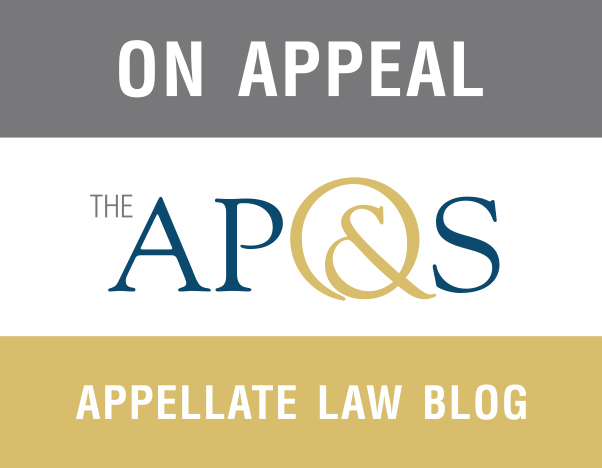This special edition of the Fast Five on Rhode Island Appellate Practice features four questions an appellate attorney should be prepared to answer. Statistics reported in the Rhode Island Judiciary’s 2012 Annual Report provide helpful guidance on the answers to each of these questions.
(1) HOW LONG WILL MY APPEAL TAKE?
Whether you represent an appellee who wants confirmation that the trial court correctly decided the case or an appellant who wants the trial court’s decision reversed, clients often want to know how long the appeal process will take. There are a number of factors that can affect the length of time a case will spend in the Rhode Island Supreme Court, including the number of briefing extensions requested by the parties, the Court’s backlog of cases and the calendar to which the case is assigned (the show cause calendar or the regular calendar), making it difficult to anticipate the length of time an appeal will take.
Thirty days after the appellant has filed its brief, or five days after the appellee’s brief has been filed (whichever is sooner), the case will be placed in order on the argument list. R.I. Sup. Ct. R. App. P. 22. Pursuant to Rule 22 of the Rhode Island Supreme Court Rules of Appellate Procedure, cases are assigned hearing dates in the order in which they appear on the argument list, however, the following cases obtain priority: cases entitled to priority by statute, criminal cases, election cases, cases in which the State is an actual party in interest, cases involving termination of parental rights and habeas corpus proceedings.
A good predictor of the length of time an appeal will take is the Supreme Court’s statistics for the previous year. The Rhode Island Judiciary’s 2012 Annual Report reported that 47 percent of cases are resolved within 300 days of docketing. See http://www.courts.ri.gov/PublicResources/annualreports/PDF/2012.pdf. The 2012 Annual Report also reported that 447 cases are pending before the Supreme Court. Id.
(2) WHAT ARE MY CHANCES OF WINNING ON APPEAL?
As a general matter, appellees are far more likely to prevail on appeal. Jay O’Keeffe, author of the blog “DeNovo: A Virginia Appellate Law Blog” (www.virginiaappellatelaw.com), recently explained why the odds strongly favor appellees. In his post, “5 Reasons Why Appellees Win All the Time (And How You Can, Too),” O’Keeffe offered the following reasons: (1) the applicable standard of review; (2) waiver (in Rhode Island, the “raise or waive rule”); (3) procedural default; (4) harmless error and (5) right for the wrong reason. Id.
The Rhode Island Judiciary’s 2012 Annual Report indicates that appellees prevailed in 80 percent of the cases that came before the Supreme Court last year. See http://www.courts.ri.gov/PublicResources/annualreports/PDF/2012.pdf. The Court’s statistics are broken down into two categories: cases on appeal from a ruling on the Superior Court’s motion calendar and all other cases decided on the merits. Id. Eighty percent of cases in both categories were affirmed on appeal. Id. Only 10 percent of the cases that came before the Supreme Court were reversed. Id. The remainder of the cases were withdrawn, modified or contained some other mandate. Id. Rhode Island’s affirmance statistics are consistent with those nationwide, which typically are in the 90 percent range. See O’Keeffe, www.virginiaappellatelaw.com.
(3) IF I FILE AN APPEAL, CAN I WITHDRAW IT AT A LATER TIME?
Sometimes, a client may be on the fence about filing an appeal. With a twenty-day window to file an appeal, it is sometimes difficult to make that decision. Although there is a filing fee associated with filing an appeal (and sometimes a bond requirement), if a client is still on the fence on the eve of the twenty-day deadline, the client should give serious consideration to filing the appeal. Appeals may be withdrawn at any time before issuance of the Court’s decision. In 2012, 80 appeals were withdrawn before oral argument and four were withdrawn after oral argument. See http://www.courts.ri.gov/PublicResources/annualreports/PDF/2012.pdf.
(4) WHAT ARE THE CHANCES THAT MY CASE WILL SETTLE ON APPEAL?
The Rhode Island Supreme Court Appellate Mediation Program, a program that the Supreme Court implemented during Chief Justice Frank Williams’ tenure in 2003, has been tremendously successful. Forty four percent of the 200 cases that came through the Appellate Mediation Program last year were settled.
(5) DID YOU KNOW?
The Rhode Island Judiciary is working to replace its case management system for all civil and criminal cases, which will enable the courts to offer electronic filing? The project is expected to be completed in 2016. See http://www.courts.ri.gov/PublicResources/annualreports/PDF/2012.pdf.




